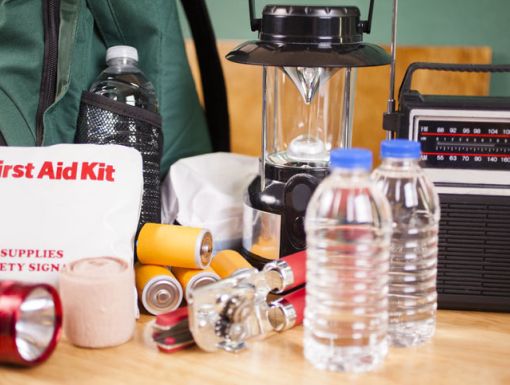
What Necessities Do I Need in a First-Aid Kit?
From kitchen mishaps like cuts and minor burns to outdoor hazards like scraped knees and bug bites, there are plenty of opportunities for injuries at home. Having a well-stocked first-aid kit in case of accidents that require basic medical attention is important for preventing infections, as well as lessening the potential severity of an injury.
A first aid kit also contains all the necessary medical supplies in one easily accessible location, helping you to save time. First aid kits usually include a variety of supplies that will help treat cuts, scrapes, sprains and burns. You can buy a prepared kit online or prepare one on your own. We’ve listed some common supplies that should be in a first aid kit to keep you and your family safe. What’s in your home first aid kit? Here are some items the Red Cross recommends:
Basic First Aid Kit for Family of Four
- 2 absorbent compress dressings (5 x 9 inches)
- 25 adhesive bandages (assorted sizes)
- 1 adhesive cloth tape (10 yards x 1 inch)
- 5 antibiotic ointment packets (approximately 1 gram)
- 10 antiseptic wipe packets
- 2 packets of aspirin (81 mg each)
- Cold/flu medicine
- 1 blanket (space blanket)
- 1 breathing barrier (with one-way valve)
- 1 instant cold compress
- 4 pair of large, non-latex gloves
- 4 pair of large, latex gloves
- 2 hydrocortisone ointment packets (approximately 1 gram each)
- Scissors
- 1 roller bandage (3 inches wide)
- 1 roller bandage (4 inches wide)
- 5 sterile gauze pads (3 x 3 inches)
- 5 sterile gauze pads (4 x 4 inches)
- Oral thermometer (non-mercury/non-glass)
- 2 triangular bandages
- Tweezers
- Sunscreen
- Insect repellent
- First aid instruction booklet
- Flashlight or glow sticks
- 6 cloth face masks
Blister Kit for Hiking and Camping
- Molefoam
- Moleskin
- 2nd skin
- Medical tape
For Major Wounds and Fractures
- Splint: moldable foam splint
- Emergency Trauma Dressing (such as Ace wrap)
- Combat Application Tourniquet or Special Forces Tactical Tourniquet
- Wound packing gauze (Combat Gauze or Z-Pak dressing)
Over-the-Counter Medicines to Consider – Especially for Travel
- Ibuprofen (Advil), 20+
- Acetaminophen (Tylenol), 15+
- Aspirin, 15+
- Antihistamine, x10
- Immodium/Loperamide, x10
- Sudafed (or an equivalent), x10
- Throat lozenges, 10+
- Bismuth tabs, x20
- Oral rehydration, x3
- Cranberry extract, x10
- Dramamine, x10
- Stool softener (laxative), x15
- Cold and flu, x20
It's important to note that if you need immediate medical assistance, do not hesitate to visit your nearest urgent care clinic for care. Learn more about when to go to urgent care, or how to choose between primary care, urgent care, and the ER.



